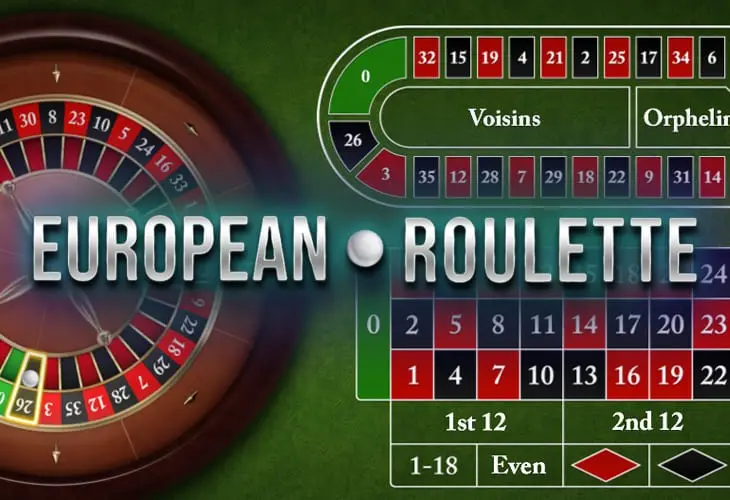Contrary to popular belief, not all formats in online casinos are built on the complete dominance of the establishment. When choosing structures where probability is calculated and statistics can be relied upon, the odds shift in favor of the participant.
It is precisely the games with the lowest casino advantage that prove that skillful calculation, logic, and understanding of the basics of mathematics can provide a tangible advantage. In such formats, not only the path to winning is seen, but also control over the outcome is gained.
Roulette: mathematical basis of low-risk bets
The most indicative discipline is European roulette. Here, the presence of a single zero sector forms a fixed casino advantage of 2.7%. In contrast to the American modification with two zeros, where the margin reaches 5.26%, the European model provides a more favorable platform for calculations.
Participants can rely on equally probable events, using even/odd or red/black. The mathematical foundation of such bets allows for the application of progressive strategies, adjusting behavior based on outcomes. It is roulette that illustrates how to reduce the casino advantage by following strict logic and not succumbing to emotions.
Blackjack: card counting as an exact winning formula
Thanks to its fixed structure, blackjack occupies a key position among games with the lowest casino advantage. When using the basic strategy table, the probability of winning significantly increases, and the platform’s dominance decreases to 0.5%.
Control level particularly increases with manual card counting – a well-known tool of professionals. Mathematics works in favor of the participant when the deck is limited, the rules are transparent, and the dealer does not receive face-up cards. This situation turns blackjack into one of the best games for winning in a casino.
Baccarat: model with a fixed margin and logical choice
Another example of a mathematically calculated format is baccarat. When betting on the banker, the margin is about 1.06%. This figure is included in the overall structure of games with the lowest casino advantage, as it allows for operating with fixed chances, without the interference of external factors.
The participant is required to choose between three directions, after which the outcome is determined by pre-set rules. The absence of complex decisions reduces the likelihood of error, thus increasing the expected return with a stable strategy.
Poker: probability and psychology instead of chance
Although poker results are often associated with luck, its mechanics are based on mathematics. The probability of combinations, calculating chances of improving the hand, and managing bets allow experienced participants to win even with average deals.
Games with the lowest casino advantage include poker because the result depends on skills, not the platform. Here, the casino only receives a fixed commission (rake), without affecting the bank’s distribution. For analytically thinking players, poker becomes an arena where logic and calculation surpass luck.
Video Poker: digital model with calculable odds
Among automated solutions, video poker stands out for its high predictability. Its variety – Jacks or Better – with the correct payout table and adherence to optimal strategy reduces the casino advantage to 0.46%.
The mechanics are simple: the participant makes a decision – to hold or replace cards. Combinations are based on a probabilistic basis, allowing for assessing prospects based on known statistics. It is because of this that video poker is included in games with the lowest casino advantage – it leaves room for logic even in the world of random number generators.
Slots with high RTP: a machine operating on numbers
Despite associations with complete randomness, some slots can be included in the list of games with the lowest casino advantage if their RTP exceeds 98%. Such machines demonstrate mathematical returns in the long run. The RTP indicator represents the portion of bets returned to players as winnings.
The slot’s mechanics may include a fixed number of reels, predictable free spins, and balanced jackpots. Understanding the payout structure, volatility level, and bonus operations allows for analyzing the machine’s behavior and selecting a model with the most favorable odds.
Backgammon: strategy as a tool for outcome management
In backgammon, logic plays a decisive role, not chance. On platforms where bets are placed between participants, the casino’s advantage is completely absent or constitutes a fixed percentage for organization. Success depends on knowledge of positions, chip distribution, and understanding reactions to dice rolls.
This approach fully corresponds to the logic of the list, as the participant influences the entire process. The absence of hidden mechanics makes backgammon particularly attractive to those who rely on calculation rather than chance.
Craps: a bet where the margin can be nullified
The craps format is interesting not only for its dynamics but also because the Odds Bet type of wager effectively has no casino advantage. In combination with Pass Line, the overall margin decreases to 1.41%. Knowledge of rules, understanding statistics, and avoiding disadvantageous secondary bets become the basis.
Games with the lowest casino advantage include craps precisely for the ability to mathematically calculate dice behavior and choose the most advantageous actions. This approach minimizes the platform’s influence and allows for using the format for systematic bankroll management.
Why does mathematics help win in games with the lowest casino advantage?
When working with calculations and probabilities, the participant receives a tool that can be applied regardless of the platform. Below are the main principles on which success is based:
- accurate calculation of probabilities based on open data;
- avoiding emotional decisions in favor of logic;
- knowledge of payout tables and combination structures;
- use of bet models with calculated progression;
- control of bets depending on expected profitability;
- analysis of RTP, volatility, and typical deviations from the norm.
Following these principles turns games into a space where logic defeats impulses, and mathematics helps understand which games are easier to win in a casino, enabling informed decisions.
Conclusion
Games with the lowest casino advantage prove that mathematics can change the rules. When the participant knows the rules, masters statistics, understands chip behavior, deck structure, and calculates odds, the platform ceases to be the dominant side.
Numbers, logic, and a systematic approach remain on the player’s side – they are what form a real strategy in the world of online casinos.
 en
en  de
de  ar
ar  es
es  hi
hi  fr
fr  nl
nl  it
it  pt
pt  el
el 









